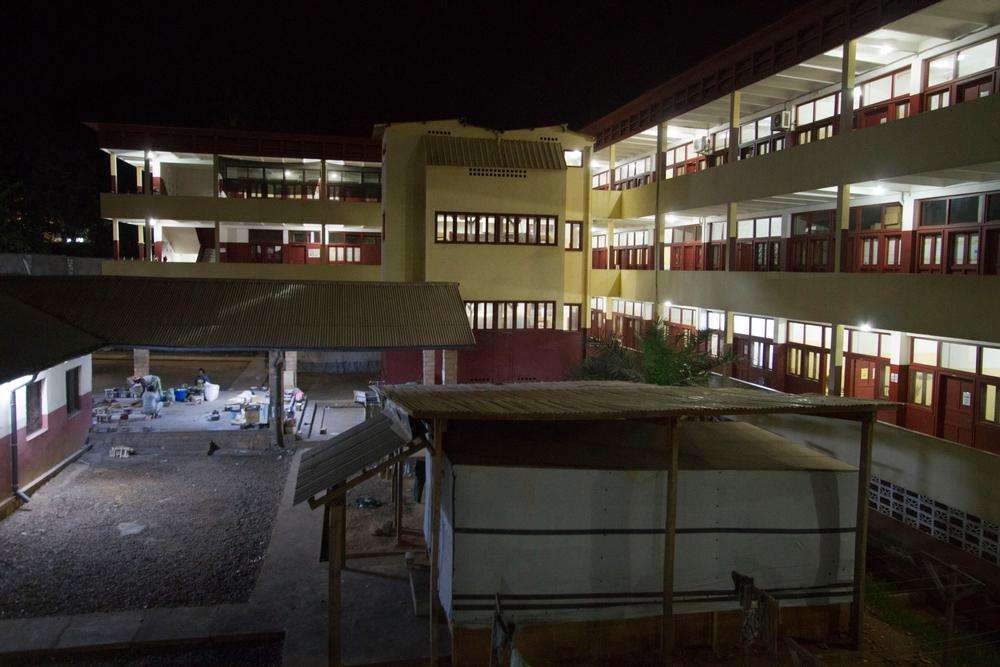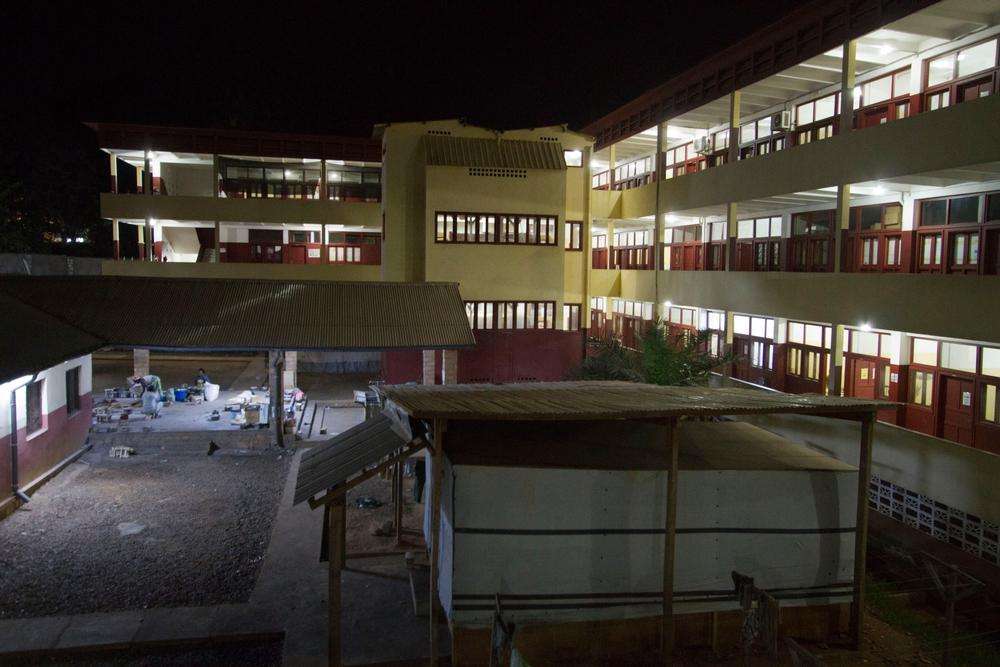David Rothstein is a pediatric surgeon in Buffalo, New York. He began working with Doctors Without Borders/Médedins Sans Frontières (MSF) in 2007 in northern Sri Lanka and has since completed month-long assignments for MSF each year, working in Chad, Nigeria, Democratic Republic of Congo, and the Central African Republic. Here, he shares a reflection on his most recent assignment in Bangui, the capital of Central African Republic, in March 2015.
As Royal Air Maroc flight 285, destination Casablanca/Douala/Bangui, descends through the hazy air over the Central African Republic plateau, several things catch my eye. The internally displaced person’s camp alongside the Bangui-M’Poko International Airport appears much smaller and less ragged at the edges than last year. There are no troops patrolling the edges of the airfield to keep kids from wandering on the runway. A super-massive cargo plane, the Antonov 235, sits on the tarmac, nose open. French armored personnel carriers and other heavy machinery belonging to European forces are being loaded on, part of a troop drawdown that is coming to a close. And the snow piled up at home is a memory farther away in time and space than 36 hours and 7,000 miles of travel.
Driving through the streets you still see droves of armed forces, but the faces of the bored, young European menboys have been largely replaced by the blue-helmeted troops of the MINUSCA—still bored and young, and perhaps a little wary as they hold their automatic weapons and survey the surrounding scenes. (The MINUSCA are the United Nations Multidimensional Integrated Stabilization Mission in the Central African Republic, authorized by the UN Security Council a year ago, and now numbering 8,000 or so with a mission to quell violence and provide stability in CAR. They have replaced previous groups of French, European, and African Union troops.)
The most palpable difference compared to last year—this may seem bland to you—is the eased security. Many places in the city previously off limits to Médecins Sans Frontières staff are now allowed and the curfew has been eased some. Despite occasional flares of violence and promises of more persistent unrest with national elections due in August, this MSF project has clearly moved into a chronic phase.
*
The situation in the rest of the country could not be more different. It’s been a little over a year since the worst of the violence hit Bangui, marked by clashes between the Seleka—principally Muslim rebels who ousted former President Francois Bozize in 2013—and the mainly Christian anti-Balaka forces. Much of CAR’s Muslim population—numbering close to a million—have been displaced internally or fled to neighboring countries (Cameroon, Chad, others). Thousands of Central Africans have been killed. Arms are cheap, lives cheaper. And money rules all… despite the political instability and security concerns, Lebanese businessmen and Chinese miners and (a few) western European game hunters still nose around in search of riches. Unemployment is rampant and the CAR government seems to have little control over most of the country outside the capital. Banditry is now the main security problem in CAR. Armed groups follow a logic of predation rather than a political or ideological ideal.
*
A man is brought in with multiple AK-47 bullet wounds to his chest, arm and leg—miraculously, none has hit a vital structure. (An aside, it is not that miraculous in the sense that it just happens that those who survive are usually the ones who are not grievously injured; with little in the way of pre-hospital care or trained first-responders, patients with immediately life-threatening wounds usually die in the streets). Two days later, a man arrives on an evacuation plane from the northeast city of Bria with spear wounds to the abdomen… and several feet of exposed intestine wrapped in a gauze. Turns out he was the one who shot the other guy (might it have been because the first guy threw a spear into him?). We place him in a separate room to recover after his operation.
*
Daily life is pretty much the same as last year. An expatriate group that includes three anesthesiologists/nurse anesthetists, two surgeons, a few general medicine doctors, two nursing supervisors, a psychologist, and a dozen or more others, ranging from project supervisors to logisticians to finance and human resources people. The core group lives at the hospital to respond to night-time emergencies, while the rest live in houses rented nearby. About half the day’s work is wound care and dressing changes, another quarter devoted to abdominal operations for penetrating trauma, intestinal perforations due to typhoid infection, and a handful of stoma reversals (patients who have penetrating abdominal trauma sometimes require temporary intestinal diversion into a stoma “bag” outside the body while they recover). Evenings spent reading, waiting for an emergency call, trading stories. Anti-malaria pills bring Technicolor dreams in various languages and dimensions. Maybe this is what Leary was writing about.
*
We stop by l’Hôpital Communautaire, a nearby government hospital, where MSF was working in December 2014, when anti-Balakas attacked Bangui and where the Red Cross now provides surgical services. Their work is much like ours, although they can only work until six p.m. due to security concerns. The new demographics of African trauma are writ large on the board of the hospital’s ten-bed Intensive Care Unit—AVP, AVP, AVP. “Accident du voie publique,” or in the English lingo of trauma care, “Road Traffic Accident.” As the African continent industrializes and paves more roads, more people drive (and drive faster and faster). Something in the range of 1.3 million people are expected to die from AVPs this year worldwide, with 90% of those deaths occurring in low- and middle-income countries (which have only half of the world’s vehicles). An additional 20-50 million are injured annually worldwide. The economic impact—consider not only the cost of care but lost income when a young man (usually) is removed from the work force—multiplies quickly and geometrically.
Bangui is the referral city for virtually any patient in the country who may need advanced surgical intervention. Imagine a country nearly the size of Texas with 4.5 million inhabitants, two airports with paved runways and several dozen more dirt landing strips. Transport times that range from hours to days by car over rudimentary roads. Air transport available to the lucky few who are cared for by MSF or the UN or the Red Cross. Bangui has l’Hôpital Général (run by MSF), l’Hôpital Communautaire (run by the government and assisted by the Red Cross), l’Hôpital de l’Amitié (government), and l’Hôpital Castor (principally obstetrics/gynecology, supported by MSF). There are district hospitals throughout the country that can provide rudimentary surgical services (appendectomy, wound care, caesarean section) but the skills are uneven and anesthesia safety questionable.
*
Sublime moments are replaced by the mundane. The ordinary transformed into the extraordinary by forces unknown; and sometimes the extraordinary fails completely and you are left empty, pondering your place in life. A young man arrives after a motor vehicle crash, consciousness waxing and waning, his scalp swollen. Before our eyes he falls into a coma and a pupil dilates. We rush him off to the operating room and drill a hole to drain the blood that had built up under his skull… and yet our joy is replaced with sorrow when he dies an hour later in the recovery room.
*
Low rolling clouds percolate above the neighboring Democratic Republic of Congo, just over the Oubangui River, seemingly afraid to cross the border. When the breezes stop a humid column of air descends, drawing sweat from the skin. Even the mosquitoes seem lethargic, drawn, anemic. We are not yet in the rainy season but from time to time dramatic storms drop sheets of water; we gather to watch from the porch, inhaling the fresh air—no smell of roadway oil here like at home, but more earthy scents—and listening to the pings of rain against metallic roofs below.
Up above us, in the Colline, the relatively glamorous houses of the French and German diplomatic residences, the Red Cross home base, other NGOs. A young boy with a shock of platinum blond hair dribbles a soccer ball just outside his home, his sneakers caked with the dark red dust of the street, the guardian watching.
*
An old woman—maybe 70, maybe 90—is the victim of a grenade attack during a home robbery where two others are also injured. Cuts to the face, chest and abdomen. She has lost a lot of blood but seems better after a transfusion. We bring her to the operating room to clean out her wounds and pick shrapnel from her skin… and just like that she loses her pulse, and dies a quiet death in front of us. I sew up a jagged cheek laceration for her family. As the nurses bind her toes and ankles together, the operating room’s dull spotlight bounces off the dark wooden cross she wore on a necklace. The worlds she had lived through... After a pause we zip up the white plastic bag around her still-warm body in silence. A rare moment of grace in a world of chaos.





